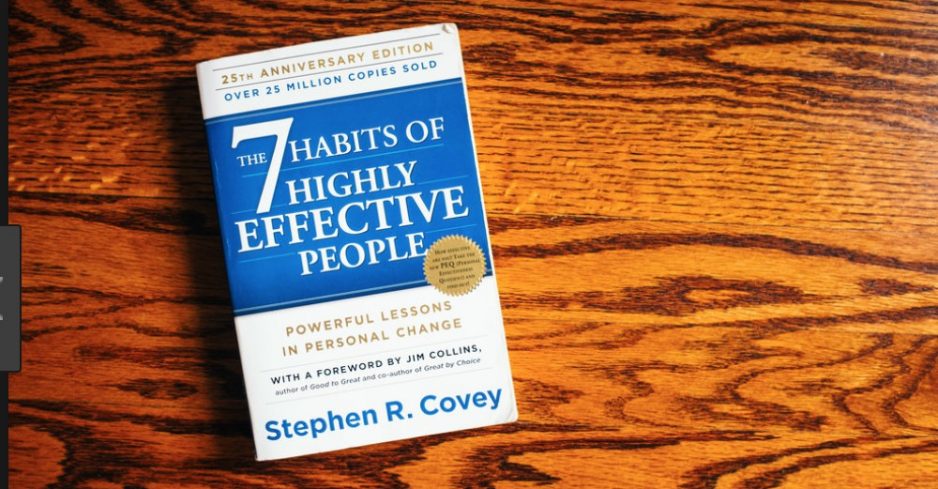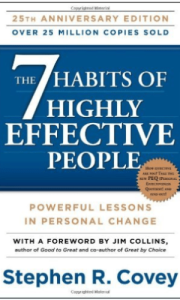What are the 7 Habits of Highly effective people? And how can we Implement them to our lives? According to Stephen covey – you can implement them by being proactive! What are they? That’s what this Review is going to tell you briefly 🙂
After you finish reading you should already know whether the book is worth getting or not.

A book that is one of the mainstream ones on the subject of self-development.
It has sold 25 million copies since it’s first release in 1989 according to Wikipedia.
In this post you’ll get to know how I got to this book, why and how I chose it.
A bit about the book and it’s 5 parts (short summary of each chapter).
Table of contents:
-Why and how did i get to this book?
-Preface (Paradigm Shift)
-Private Victory (Habits 1,2,3)
-Public Victory (Habits 4,5,6)
-Self Renewal (Habit 7)
-Conclusion (Inside – Out)
My experience of the book and my opinion about it.
Youtube review
Acquiring options
Why and how did I get to this book?
So I was looking for the next great self – improvement book to read and I researched which were the reading books in the field. I believed that I should start from the big names and then go into the specifics. ( Classics First… Makes sense no? To understand the culture – you have to first know the mainstream art 🙂 )
Besides I went to the Library and looked which books existed and as I live outside the U.S. The books also have to be translated, and that results in a book deficiency. And so, that was the book I’ve found that was both mainstream self-improvement and available.
Preface
This is the first part of the book, here Covey concentrates on explaining what is a paradigm, and that in order to change ourselves or learn something new, we must first understand, that things we find obvious are not at all like that.
It is important to explain the meaning of paradigm before the start of the book, because If we lack this critical understanding it would be difficult for us to understand and apply the principles of the book. (We should allow the idea that our most basic assumptions are not necessarily correct)
Private Victory
This is the Second part in the book that includes the three First Habits.
It is explained that before you master yourself and those principles, it would be very hard to practice the Public Victory habits, because if you’re not honest with yourself and do not act according to your wishes, it would be difficult to take others into your world.
Habit 1: Be Proactive
This is the mother of all habits, a bit similar to the understanding of the paradigm without which none of the others could be applied.
There's no such thing as I can't, just I choose not to.
A Nazi prisoner in WWII
In this chapter Covey refers to Vitor Frankl’s book – In search of meaning (Most probably one of my next books), it happens on the background of WWII and Viktor ends up somehow under control of Nazi soldiers, he is subjected to different horrible situations, as an example of burrying lots of corpses, the denial of food, freedom, sleep etc.
Understands that he is free
During this period he finds out a very important finding in psychology.
He understands that even though all his freedom was taken away and he has no control over his body or actions he could always be in control of his mindset and of the way he views things.
The beauty of being human
That is the beauty of being human. That is what differs us from animals. They do not have an opinion on what they do, they just do it because of instincts, while us humans, can look at our thought process and decide that the way we acted was incorrect and that we should look at it from another perspective.
The ultimate key for change and improvement.
Without the understanding that we are in control of our actions, and that it is not the circumstances but our choices that shape our lives, there would be no point in trying to apply all the other principles.
Because if a person believes he has no control over himself and chooses to blame the environment, he would not be able to change any of his actions, and thus that would make him a bit more similar to an animal…
Habit 2: Begin with the end in mind.
Imagine you driving to the cemetery, as you get out of the car you notice friends and other people you know, coming to share the last memories of a deceased.
As you approach closer, you suddenly realize that it is your funeral that is happening 3 years from now…
There will be 4 different people from 4 of your life spheres that will be reading a eulogy.
Those will be: A member of the family, a friend, a co-worker, a member of the community or church you attend.
What would you like each of them to say about you?
Once you know the answer to that, you may begin to live your life with purpose, because you know how you want it to end!
Habit 3: Prioritize
Could only follow Habits 1 and 2.
After you understood that you are responsible for your life, and know what you want to do, you must make sure that you organize yourself correctly and put your time to the right activities.
Time management tools
Here, a few tables are offered, and suggestions on how to understand the difference between important and unimportant things. The book also elaborates a bit more about how you could organize your time in accordance with your goals, tasks and roles in life, which will help you achieve the things you wish.
The relation between Private and Public Victory
After you’ll know you’re on the path to achieving what you wish in life you will slowly open yourself up for sustainable relationships with others. Which will be based on true solid ground, that will be laid below your feet. And from which you will be able to push yourself away from.
Not having an idea what you want to do tomorrow, how you’re going to do it. And not being sure even of the fact that you are in control of yourself, would make it really difficult to have a sustainable relationship.
Like the book already?
Get it for free with Audible free trial or Amazon
https://amzn.to/36cfzOE
or eBay
https://ebay.to/2T5mi5X
And don’t forget to send the order confirmation to my mail to get the bonus PDF worth 24 GBP (Instructions in bottom of post)
Public Victory
As I’ve just mentioned in the description of Habit 3, this Victory is most often tied to habits 1,2 and 3. That is not to say that until you achieve all your goals you must put your relationships to a halt. But, if you don’t practice those habits it will most definitely be difficult to sustain healthy and long term relationships.
The habits described herein, are habits that are meant to help you live in harmony with other people, and make out the most out of your relationships.
Habit 4: Think win-win
Our competitive environment.
A lot of people were born and raised in an environment that promotes competition. They were raised with the essence that there is a whole sum game going on in the world.
Meaning that – in case that someone gets a bigger piece of the cake, the others will have smaller ones.
But, that is not essentially true, and is actually not true in most of the cases.
An alternative paradigm.
Almost always there is a solution to be found that will serve the interest of both sides of a conflict.
That solution may be achieved in case that both sides are transparent, and open to each other, and believe in the existence of this solution.
Of course, we should concentrate solely on what we can change within ourselves. Because, that is our zone of influence.
But, in many cases, by believing in the solution, we motivate others to do so aswell.
An example
An example is in order.
Two people found an orange, and both of them wanted it and began arguing.
Eventually after lots of arguing they decide to split the orange in two and each one of them would get a half, thus creating a compromise. So nobody gets what they want but only half of it..
After each of them goes away, one of them takes the peel off, throws it away in the garbage and eats the orange, and the other takes the peel off throws the orange in the garbage and makes food art with it.
Example explained
Both those people could get everything they wanted, but instead they threw away half the value. That is the essence behind win-win agreements, those are agreements in which nobody loses their interests, and everyone get what they want, but there must be an understanding in relationships in order for that to happen and trust, so that you could state your true motives and come to the solutions together.
Habit 5: Seek first to understand and then to be understood
Hard to apply, a push for productivity.
Another eye opening habit by Stephen Covey that is easier said than done. But, when turned into a habit, it is supposed to be of great value and multiply our production in relationships. (Still haven’t applied it so I could only say that in theory)
Purely listen and reflect
This habit refers to the ability to purely listen to other people and being able to see the things completely through their perspective, without putting your autobiography onto their lives, meaning, truthfuly trying to understand why they do what they do, without judging, advising, interrogating or agreeing or disagreeing, simply trying to reflect to them if you understand what they are saying and what they mean.
Allows people psychological space
If people get that psychological space, it is a lot easier to speak to each other, and not have the conversations that we usually do in which we both just speak our side of the situation. In this way we could understand the whole picture
Habit 6: Synergize
Result of all the other habits
This habit comes when all the others are at a good level, this is the essence of humanity according to covey and I tend to agree with him.
Synergy - Communicating in Harmony
He describes that synergy is a higher level of communication, in which few words are required and each person understands the other, and they work one with the other in harmony and with best wishes, when this environment is present it is possible to create great results, for instance. In this case the result of two people could be more then 2. 1+1 could equal 4,8 or 16. because you work together to produce great solutions.
Present in extreme environments, but could be routine.
It is hard to describe this environment, but it is usually present in some extreme cases when people are able to empathize. War or death of loved ones. But it doesn’t have to be like that, it could become a part of our daily lives and be sustained this way.
Habit 7: Sharpen the saw
Too busy to sharpen the saw
Imagine that you are walking in a forest and you see someone trying very hard to cut a tree but with no success, you stop and ask him how long has he been cutting this tree, and he says that for five hours and that it’s very hard. You suggest him to stop for a moment and sharpen the saw. The man replies “can’t you see that I’m busy cutting the tree”?
4 Improvement areas
This habit includes the constant improvement of oneself in 4 main areas Physical, Mental, Spiritual, Social.
Physical – Resistance training (Pushups, weights etc.) Elasticism (Stretches) and Endurance (Heart)
Mental – This one is for reading and writing and developing your knowledge.
Spiritual – Setting goals, meditating, planning.
Social – Improving your interactions with people each time bit by bit.
Conclusion ( Inside out )
We are hereby reminded that all change that is going on, could only occur within our circle of influence, meaning, by us changing our behavior or responses.
My experience and opinion
Longer read
It’s been a long time since I’ve first picked this book. Reading it chapter by chapter, slowly. I got the opportunity to see the very deep truths within it( Maybe except chapters 5 6 and 7 which I read quickly 🙂 ).
Habits 1 and 3
I have already had similar guidance from Think and Grow Rich by Napoleon Hill. But still I did have the opportunity to try and apply a few of the principles described here.
Habit 1 mostly helped me as becoming aware of it, the importance of taking responsibility. Habit 3 Provided me with a table that Indeed helped me organize my time, I still am trying to incorporate it correctly into my weekly routine. I was aware of some parts of it before but it still helped me strengthen the awareness about it.
Habits 4,5,6
Habit 4 is great, really! But if you want a really good description of it, check out Getting to Yes by Roger Fisher and William Ury, I really suggest reading that book, it really helped me in daily situations and dilemmas! ( Don’t forget to mail me the order number if you get it through that link to get a bonus PDF, mail is in the bottom of the post)
Habit 5,6 and 7 I read at the same day and so didn’t have much opportunity to apply but I could say that I’m really glad that they were brought to my awareness. My relationships with my family is far from being perfect and those habits (5,6) are key to apply
Overall Feeling
So basically overall feeling is very good about this book,
Although I did not apply all the tasks in this book, it is most definitely great to be aware of the things inside it, I believe that with time it will help me improve myself gradually. ( Hard to say right after reading, it should be measured in the long term 🙂 )
Acquiring options

I send the bonus manually so please do forgive me for the delay, usually will be sent within 24 hours.
Youtube Review
Related Articles
Smart Passive Income Community Review – 3753 Words
You are probably here because you want to make “passive” income.In this post I describe my experiences with the SPI* membership which I joined for

7 Steps To Freedom S2-C5: Finding Demanded Products (7)
What makes a product awesome? How to find an existing marketable product? How to find an audience and make a product for them? How to test
Smart Passive Income Community Membership Deep Review
If you have been considering to join the Smart Passive Income Community of Pat Flynn then In this post I’ll give you an overview of
